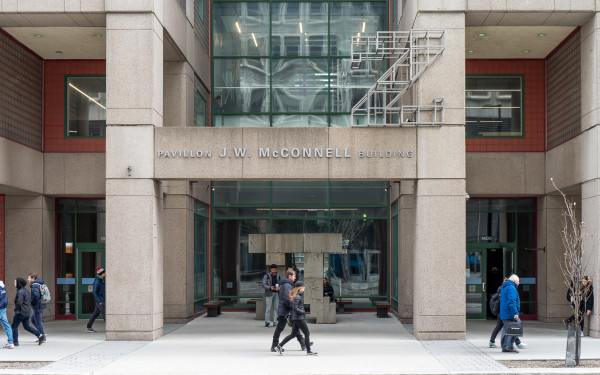Concordia Undergraduate International Students to Face Tuition Hikes in September
Regulated and Returning Students Exempt from Hikes
Concordia’s Board of Governors approved a new framework of funding for international students last Tuesday. As of September 2019, new international students in deregulated programs will see a yearly tuition increase between 4.25 per cent and 8.25 per cent.
Quebec students and regulated international students will see a hike of 3.6 per cent, while France, Belgium, the rest of Canada, and returning international students’ tuition will be raised by 4.25 per cent—an index imposed by the provincial government.
The university says that going forward, undergraduate students will see fees increase incrementally every year. Professional and non-research Masters students will have one increase for the full program while future increases will be linked to strategic enrolment management and budget planning.
The hikes were prompted by Quebec’s decision to change its university formula for international students, with exceptions for French and Belgian students. As of September 2019, Quebec will no longer provide funding for international undergraduate, professional, and non-research Masters students. However, it will allow universities to keep full tuition fees charged to deregulated students. International PhD and research Masters students are not impacted by deregulation.
This, according to documents provided, will impact Concordia with a loss of $6.6 million annually. The projected loss was based on government-provided data between 2016-2017, though deregulation began in 2017.
Student representative Eunbyul Park was skeptical, saying Concordia could have extra revenue, which wasn’t taken into consideration.
Though Concordia claims these documents are public, they were incapable of providing them to The Link, who were unable of independently verifying the data.
In the face of criticism, Concordia says they are not making education any less accessible, that the university will still have some of the lowest tuition fees in the country, and that they hope to “meet the market” prices. They stress that the proposal is “modest by any comprenable Canadian standard,” and is a “balanced and reasonable approach to the valid concerns raised,” said Interim President Graham Carr.
“This is a challenging subject, but a necessary move for the university,” said Georges Paulez of the financial committee. “As a Board we need to ensure the university has the tools and resources to meet the continuing and growing needs of all members of the Concordia community and our stakeholders.”
The university said they plan to pour $1.1 million in fee remissions for international students and provide an increase from $100,000 to $900,000 in entrance scholarships for new international undergraduate students.
They also say they “plan to continue investing in international students by supporting language training to enable international students to join the Quebec labour market, expanding on-campus work opportunities for international students, providing funding to offset emergencies, such as currency fluctuations.”
They also say additional revenue will be used to “invest in the overall academic mission of the university to benefit all students.”
Carr said the university aims to give international students predictable pricing and that the hikes will be able to offer potential students that security by allowing students to clearly see what their tuition will look like every year. He added this is designed to make Concordia the more attractive choice for internationally mobile students.
Concordia’s 2019-2020 budget forecasts a surplus of $1.2 million, with elimination of the deficit taking place in 2018-19, one year earlier than anticipated.
The budget also said the university suffered a loss of more than $90 million to its operating budget following a series of government budget reductions that began in 2010—but, based on its reinvestment schedule, they “expect to have fully recuperated the impact of budget reductions by 2022-23.”
Though the Quebec university sector is facing a decline in student population, Concordia has seen an increase in enrolment “due in part to the fact that our international student population has seen a significant jump, from 12.2 per cent of the student body in 2011-12 to 20 per cent today,” while the graduate student population grew from 16.7 per cent in 2011-12 to approximately 20 per cent in 2018-19.
Concordia has recently received a bequest of $30 million—the largest gift ever to the university in support of students—from an anonymous donor. However, President Alan Shepard said the money wasn’t readily accessible.
Despite this, Shepard holds that the projected $6.6 million dollar loss is accurate and the hikes are necessary.
“Concordia values diversity and we want to provide recruitment incentives to attract top international talent, but we have no intention of following the example of other Canadian institutions by dramatically increasing the size of our international students just to generate more revenue,” said Carr.
Shepard said the core of Concordia is respect of diversity and access.
“Given changing policies, to have ignored that and not made changes in tuition framework would be irresponsible,” he said, adding that he wants the university to be great for all current students and future generations of students, which requires steady resources.
“You only have to walk around here for a few minutes to see people from all over the world and many people who are the first in their family to attend university. We are not an elite institution and we are not a place for elites,” he said.
“I completely rejected the idea that we are making an elite education for rich people, it’s not true.”
“The value of a Concordia education is not the decisions we make or tuition we pay, it is the students who have been fighting and upholding strategic directions, pushing for better from this institution. The students are what give Concordia a global reputation, and it is in spite of you and in spite of tuition hikes. We have to protect that and you haven’t, you failed.”
—Sophie Hough-Martin
*Criticism *
While the meeting took place, about 75 students protested in the lobby of the GM building—where BoG meetings take place. In the room, both student representatives, Sophie Hough-Martin and Park, were adamantly against the hikes.
“The research presented to Concordia’s board did not include citations of the elasticity studies conducted, there was not a limitations section, nor demographic information provided for the makeup of which prospective international students were surveyed and consulted regarding tuition,” said Hough-Martin.
Hough-Martin also said Concordia “hyper-inflated its comparators so that their exorbitant hikes would look less costly.”
She stresses the $1 million promised in scholarships would realistically pay for around 40 students to have one year of tuition covered, under 10 per cent of the students affected by tuition hikes
“Given the fact that the current status quo is for 8 per cent of international students to have bursaries, I’m not sure how this proposed increase in funding will help at all,” she said.
Shepard told The Link that when students apply to come study in Canada, they must prove they have sufficient funds, and so the hikes will not put people into such financial precarity.
One international student, Sheida Shamloo, denounced the fact that they must do unpaid internships in their program and have racked up $30,000 of debt before the crowd of protesters.
International students also have a cap on how many hours they are allowed to work in the country, which puts them in a precarious financial situation. Recently, international student Jobandeep Sandhu faced deportation for working more than 20 hours a week.
“You’ve told international students that you’d rather be complicit in austerity than stand up with us,” said Hough-Martin to the Board following the vote. “We are following the footsteps of every other university instead of being innovating and ‘Next [Generation]’ and coming up with new financial solutions instead of making the most vulnerable pay for it.”
“The value of a Concordia education is not the decisions we make or tuition we pay, it is the students who have been fighting and upholding strategic directions, pushing for better from this institution,” she went on. “The students are what give Concordia a global reputation, and it is in spite of you and in spite of tuition hikes. We have to protect that and you haven’t, you failed.”

_900_506.png)




